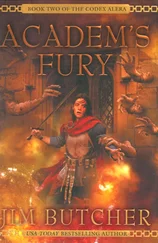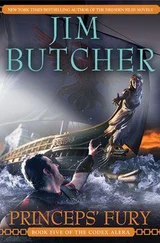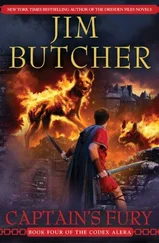Black shapes darted and flitted through the smoke and firelight and shadows that covered the city, seemingly moving at random through the crisis. Amara gritted her teeth. She and a class of first-year Cursors from the Academy could have flown into the city blowing trumpets and breathing fire without being noticed, much less stopped. Any of those swift-moving human forms could be enemy fliers.
Amara looked wildly around the city, struggling vainly to identify Gaius Attis or one of the High Lords or Ladies. She darted up several dozen yards to try to get a better view. Riva’s lofty towers— Great furies, what kind of crowbegotten competitive delusion infected this city’s architects, to build so many of the bloody things? —presented a dizzying aerial maze of cornices, arches, and spires. The fires below and the rising columns of smoke threw off every angle, made distances difficult to judge, and reduced every airborne figure to a featureless outline.
There, down near the street level. An avian shriek rose from below, and a falcon-shaped burst of white-hot flame soared down into an alleyway, plunging in a raptor’s strike. The light from the fire fury briefly illuminated one of the vord infiltrators, lurking not thirty feet from a laboring wagon heavily loaded with wounded civilians. The fire falcon exploded into a fireball that shattered and scattered the enemy horror, leaving behind half a dozen small fires and a large, greasy stain. Campfire sparks leapt from the smaller fires, swirling into a flowing stream that rushed up through the air and gathered upon the extended wrist of a woman dressed in legionare’s armor. The sparks congealed into the form of a small, almost delicate hunting falcon, and let out another whistling shriek that somehow conveyed a fierce sense of primal triumph.
Amara rushed down toward Lady Placida, who tossed her long braid of red hair over her shoulder and turned to face her before she had come within a hundred feet, her sword in hand.
Amara slowed, lifting both hands, until she had come close enough for Lady Placida to see her features in the light cast by the glowing falcon.
“Countess Amara,” Lady Placida said. She returned the sword to her side with fluid grace. Her voice was roughened by smoke and exertion. Her eyes turned back down to the escaping wagon below, and she waved at the elderly man coaxing its overburdened mule, gesturing for him to continue. “What can I do for you?”
“Did you know that there is no longer an aerial curtain over the city?” Amara called.
Lady Placida’s eyes widened, noticeable even in the half-light against her smoke-stained face. “What? No, no it’s been complete madness here.” She looked around her, clearly calculating. “But that would mean that… bloody crows. We’re vulnerable.”
Amara nodded. “Where is Aquitaine?”
“The southern plaza. Probably still there.” Lady Placida flicked her wrist and sent the little fire falcon hurtling up into the night. “Countess, apprise the Princeps of the situation. I will warn the Citizens— behind you! ”
Amara immediately redirected Cirrus, and shot twenty feet down, to her left, and behind her. She turned over as she went, and had a brief vision of a man in black chitin-armor, long blade in hand, plunging toward her and compensating for her dodge. She twisted and arched her back in midair, and the sword swept by not two inches from the end of her nose.
With a mental hammerblow of recognition, Amara realized that she knew the young man wearing the collar and armor of the vord. His name was Cantus Macio, a young Forcian Citizen who had attended the Academy in one of the same two-year terms she had been there. His dark blond hair was shorter than she remembered, his face and body heavier with maturity, but she remembered him. He’d shared several of her classes and been one of the minority of Citizens who would treat the relatively small number of freemen at the Academy with courtesy and respect—and had been one of the more capable furycrafters in his class.
Macio’s eyes showed no similar recognition. They were wide and empty. Amara quickly changed her course to a reciprocal of his, which would buy her the largest lead before he could alter his own path of flight, dodging lightly around a column of smoke so that Macio wouldn’t be able to see her immediately.
Above Amara, three more vord-armored forms had plunged down upon Lady Placida. She bobbed lightly in the air, left and right, then drew her slender sword and struck in the same motion. A shower of bright green sparks flared up, and the enemy flier she’d struck went soaring past her into an uncontrolled spin, trailing a bright scarlet spiral of blood. He slammed into a wall with sickening force, as Lady Placida shot straight upward, turning to engage the other two vord-taken Citizens.
As the leading foe closed on her, Lady Placida reached out with one hand, and a wooden banner pole thrusting from the side of a tower suddenly twisted in place and lashed out like a club, striking one of the enemy fliers in the hip and sending him tumbling. The second flier closed to sword range, and sparks lashed out in emerald fountains as his blade met Lady Placida’s, chiming half a dozen times as the two swept past one another.
Lady Placida spun in the air to face Amara, blood coursing from a cut on one cheek. “Countess!” she cried. “Find the Princeps!” Then she spun again, her lips locked in a defiant snarl, as the pole-struck Citizen swept past her, blade in hand. The light and steely music of the clash of powerful metalcrafters rang through the fire-choked night.
Amara stared up at Lady Placida for a heartbeat, torn, but her duty was clear. Even more than its most capable furycrafters, the Realm needed leadership. Princeps Octavian might be on his way, but he was not here . Princeps Attis was. If Alera lost him now, in these chaotic circumstances, the confusion of sorting out who would take command could mean the destruction of the Legions as well as the civilians they fought to protect. They might never reach the fortifications at Calderon.
She turned and willed Cirrus to plunge them both into the nearest plume of smoke, the better to hide from any pursuit, and rushed southward through the city’s towers. The route was treacherous, deadly. Slender stone bridges arched between some of the towers, and she nearly took her head off on one of them, concealed as it was in smoke and shadow. Banner poles and stone carvings thrust from the towers, too—but she dared not fly at street level. Below, where the refugees and lower-class civilians had dwelt in numbers, laundry lines frequently crisscrossed the streets. Hitting one at flight speed would be lethal.
She found the southern plaza within moments—a broad, wide-open space of furycrafted stone that had been used as a market practically since Riva’s founding. A lone figure stood in the precise center of the plaza—and even from her elevation, Amara recognized the bearing and profile of Gaius Attis.
In a circle around him, filling most of the rest of the plaza, stood more than a dozen feral furies, the smallest of them larger than a bull gargant. A serpent, its scales made of granite and obsidian, coiled upon itself, its back broader than a large city street. The deadly, wispy form of the wind-shark Amara had seen before came next, swirling and pacing in a circle all around Attis. A bull formed of knotted roots and hardwood boughs snorted and tossed its head, each of its horns longer than a legionare’s spear, while its cloven hooves scraped and scored the stone of the plaza.
The air fairly shimmered with power, the energies of those enormous, aggressive furies thickening it until Amara felt that she could hardly breathe. She stared down for a few seconds, stunned. Furies of that size and strength were tremendously powerful, the sorts of beings that could only be mastered by the most powerful Citizens in the Realm. If anyone had commanded even one of these beings, it had been someone with the skill and power of a High Lord.
Читать дальше











